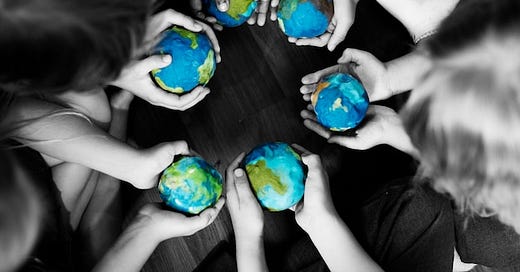In 2015, my wife and I moved to a remote part of Armenia, to work at a UWC. We were drawn by the fresh mountain air, but even more so by the school’s mission statement.
“United World Colleges (UWC) is a global movement that makes education a force to unite people, nations and cultures for peace and a sustainable future.”
Students of every culture and country imaginable had come to live together, study together, grow together, and make the world a better place - together. And in spite of the challenges that naturally arose, staff and students alike all tried to bear this in mind. It may not have been perfect, but every member of this community tried.
Global events have become increasingly concerning, and as parents and educators we wonder what kind of world our children will inherit. There’s the war in the Ukraine, body dysmorphia induced Ozempic abuses, genocide in Darfur, the woman-life-freedom protests in Iran, climate issues reaching new levels of crisis, and now this week’s horrific events unfolding between factions in Palestine and Israel…
The list is seemingly never-ending, isn’t it.
Change is urgently needed.
The world is burning, and education is the only thing that can save it.
Learning about each other. Learning about why things are the way they are. And - most importantly - learning how to make the world a better place.
As parents, we can often feel helpless in the face of so much. But our superpower lies in how we support our children, whether it be through their academic education, or the essential learnings they need to inherit and heal this aching world in the future.
Parental engagement in education makes all the difference in how our children thrive, and my article on Saturday delves into this in greater detail. Make sure you have a read, and do let me know your thoughts.
In the meantime, take the time to hold your children a little closer today, and appreciate them for the blessings they are.
I know I will be.
“If we are to teach real peace in this world, and if we are to carry on a real war against war, we shall have to begin with the children.”
Mahatma Gandhi
Extra Credit Reading:
Children - A Blind Spot of Peace and Security
THIS WEEK…
Listen to:
While a great deal of music has emerged from the events of the past year, none have been more impactful and heart-breaking than Shervin Hajipour’s Baraye. A Farsi word meaning “because of”, the song was written based on tweets from young Iranians listing some of the reasons why they protested the IRI, Hajipour posted that “the lyrics of this song were written by you to relieve your pain”. Though arrested by the regime two days after its release, he won the first-ever special merit award at the 65th Annual Grammy Awards for Best Song for Social Change.
Watch this:
Sometimes the classics are the best. They remind us of what really matters during trying times. Truth. Integrity. Justice. And - as many high school literature students know - Harper Lee’s Pulitzer Prize-winning novel, To Kill a Mockingbird , delivers all of these, and then some. Robert Mulligan’s 1962 adaptation focuses on a lawyer defending a Black man against a false rape charge, amidst his attempts to educate his children against prejudice. And whether in the 1930s or 2020s, teaching our little ones right from wrong is something we can all relate to.
Worth reading:
If ever there was an era that aimed to make the world a better place, it was the ‘60s. And the music of the ‘60s was as iconic as it comes. Written by Michael V. Drake, President of Ohio State University, and drawn from an undergraduate class he teaches on music, civil rights, and the Supreme Court, this article discusses five songs that became anthems of their time, and beyond. Bonus points for you if you also read this paper on music and protest.
Know someone who might like to join our conversation about education? Fantastic! Go right ahead and forward this email to your friend, and invite them to subscribe.
As always, do feel free to reach out at any time - I’d love to hear from you.
Yours in the spirit of inquiry,
Alexander




